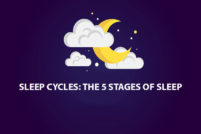As more people seek out natural solutions to their sleep problems, melatonin has gained a lot of recognition for its sleep-inducing capabilities.
But what is melatonin? And what effect does it have on our bodies and brains?
What Is Melatonin?
Melatonin is often referred to as “the sleep hormone;” however, it’s better understood as a “hormone of darkness.”
Rather than acting as a sedative, melatonin tells your brain that night has fallen and it’s time to sleep. Melatonin is the main hormone synthesized and released by the pineal gland.
It’s both highly lipid and water soluble, meaning it can easily penetrate cell membranes and the blood-brain barrier bringing about effects in multiple systems throughout the body. [1]
Within the brain, melatonin is produced in the tryptophan-serotonin pathway: Through this process, the amino acid tryptophan is transformed into the neurotransmitter serotonin, which can then be used to make melatonin. [2]
Natural melatonin can likewise be found in a variety of food sources, including tomatoes, walnuts, cherries and dairy products.
Supplements containing synthetic melatonin are also available over-the-counter. [3]
How Does Melatonin Work?
The release of melatonin is controlled by our biological clock which generates our circadian rhythms: our bodies’ natural day/night cycle.
This “clock” lies deep in the brain, within the suprachiasmatic nucleus (SCN) — a bundle of specialized nerve cells located in the hypothalamus. [4]
Many internal and external factors influence our circadian rhythms: The principal one being light. [5]
Stimulation from light during the day suppresses the release of melatonin, causing us to feel more alert and awake.
Once the sun sets, decreased light stimulation causes your level of melatonin to start to rise.
This increase typically takes place two hours before bedtime, or around 8 pm. [6]
The rising level of melatonin stimulates sleepiness by bringing about several physiological changes, including: lowering body temperature, reducing arousal/alertness, delaying the production of the stress hormone cortisol, and reducing blood pressure and blood sugar. [7]
We reach maximum sleepiness when melatonin levels are at their highest, which occurs some time between 2 and 4 am.
Our level of melatonin then gradually tapers off towards the morning, signaling that it’s time to wake up.
4 Tips to Influence Melatonin
In addition to light, several other factors can influence our body’s release of melatonin, such as our behavioural patterns and certain medications.
You should work with your natural melatonin, not against it by structuring your evening routine in a way which does not conflict with melatonin release.
Two hours before bedtime, when melatonin levels begin to increase, start winding down for the day and reduce your exposure to light: [8]
- Turn off overhead lighting.
- Avoid electronic devices.
- Use “night-mode” on smartphone if necessary.
- If you do watch TV, do so from a minimum of 6-feet away. Better avoid it altogether.
Melatonin And Sleep Disorders
A certain category of sleep disorders are caused by disruptions in circadian rhythms, which affects the release of melatonin.
Understandably, when melatonin release is out-of-sync with our day-night schedule our sleep is negatively impacted.
For instance, during the winter months when days are shorter we have less exposure to light and consequently melatonin may be released earlier or later in the day.
This can lead to development of seasonal affective disorder or winter depression. [9]
These circadian rhythm disorders can be treated with light-therapy; or, alternatively, through the use of melatonin supplements.
Melatonin And Dreams
The lucid dreaming community touts melatonin supplements as a means to induce vivid dreams, and even facilitate lucid dreaming.
According to self-reports, melatonin can increase the likelihood of having vivid dreams, and may cause nightmares. However, all sleep-aids do so to a certain extent. [10]
This is likely due to a more rapid shift from REM sleep to state of waking, which causes us to remember dreams more easily.
Alternatively, a phenomenon known as “REM rebound” may be the culprit: When you begin taking melatonin supplements your body begins to make up for lost sleep, spending more time in REM or having higher-quality periods of REM.
This can result in the experience of dreaming more, or more vividly. [11]
Melatonin Supplements
It’s important to keep in mind that melatonin supplements contain an intrinsically different type of melatonin than that which is produced by the human brain.
Additionally, as melatonin is not a sedative, it will not increase your sleep drive or need to sleep; but can be used to gently coaxed your circadian rhythms back to a more natural schedule. [12]
Now that you know what melatonin is and what role it plays in your sleep-wake schedule, you can make changes to your daily routine to help boost its effects.
The easiest way to do this is to ensure you get the right level of light stimulation throughout the day: spend the daytime in as much natural light as possible, and limit your exposure of light in the evening before you hit the mattress.





